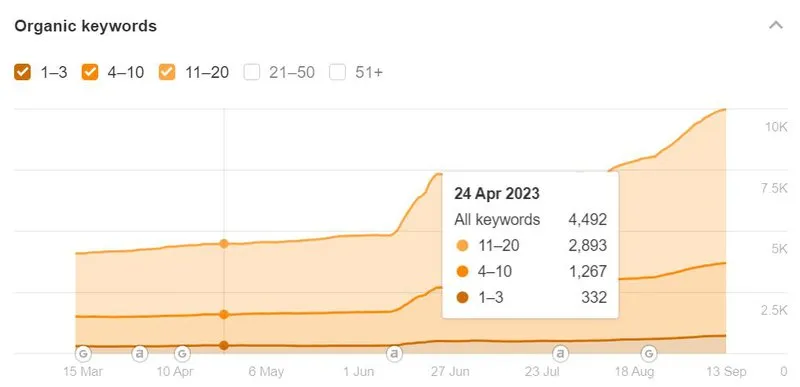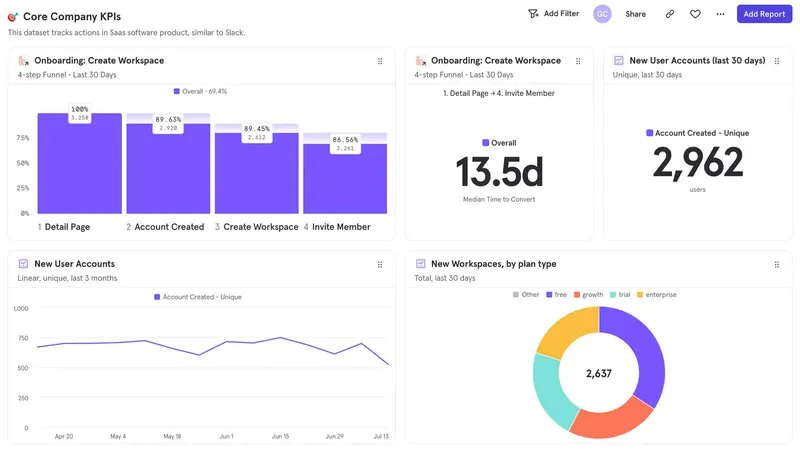Top 10 Marketing Management Skills Your Business Needs in 2026
These days, an internet connection and the right digital marketing skills make it easier than ever to reach your customers, create connections with them, and enable your business to grow.
Published November 5, 2024

Marketing management, made digital
In 2026, digital marketing is not just a popular activity brands tinker with online, it is an activity brands must engage in if they wish to compete for leads, conversions, and long-term customers. Lucky for them (and for you), there are countless new digital marketing management tools, technologies, and trends cropping up around every corner.
With a digital device, an internet connection, and the right skills, the possibilities of what you can accomplish in the field of digital marketing management and the returns you can reap are near endless.
But you do have to mind the gap. The talent gap, that is.
The digital marketing talent gap
Digital marketing management is in high demand for all types of brands, with social media budgets set to double over the next five years. According to research, 33% of traffic from Google’s organic search results hits the top of the SERPs, and worldwide digital ad spend is expected to exceed a whopping $880.9 billion by 2023.
Still, many traditional marketing professionals have yet to achieve entry-level competency in digital marketing skills and digital marketing management skills.
Compound the above with the fact that the modern-day workforce is shifting to the world of freelance work, and an unavoidable and growing skills gap has begun to affect brands’ abilities to harness the power of digital for marketing management purposes.
When it comes to digital marketing management, 90% of digital marketing managers report falling short on the skills they need to succeed - and only 8 percent of brands feel that their digital marketing management personnel are strong, capable, and accomplishing set KPIs.
Your customers are, very likely, online. Competing businesses are online. If you want to market your products or services and reach your business goals, you need to be online too -- and that may mean your business will have to close the talent gap.
What is marketing management?
Marketing management is the organizational discipline that focuses on the practical application of marketing orientation, techniques, and strategies for enterprises and organizations, keeping in mind ideal customers, business positioning on the market, and consumer preferences.
A marketing manager makes decisions that ensure the branding, and marketing efforts are fully aligned with customer needs -- and helps the business better position itself on the market.
In other words, marketing management is the “planning, organizing, controlling and implementing of marketing programs, policies, strategies and tactics designed to create and satisfy the customer demand for the business' product offerings or services on the market, to reach its revenue goals and generate an acceptable profit.”
OK, that's a pretty good definition, but what does it really mean?
(Source)
What does a marketing manager do?
A marketing manager's job is to establish and direct all marketing efforts for the business. They make decisions related to the different platforms the business wants to market their products on, help define messaging for the ideal customer, and ensure marketing-related projects are run smoothly.
Different marketing efforts may include target marketing, demand generation, developing pricing strategies, executing marketing channels, digital advertising, and monitoring the latest market trends (including the shift in consumer preferences, emerging communications platforms, and more.)
A marketing manager often uses marketing frameworks and marketing plan templates to create and execute the marketing strategy and bring the marketed product/ service closer to the customers.
Top must-have skills for every digital marketing manager
So, what skills does the modern-day digital marketing manager actually require to keep abreast of their team, tools, and outcomes? In a way, today’s digital marketing managers are like orchestra conductors.
They need to know all about the different “instruments” in play, as well as how to manage them to create a lively, interesting, and engaging symphony that is sure to attract and retain an audience. These instruments, or skills, can be divided into two principal categories - professional, industry skills, and soft management skills.
What are marketing manager skills?
Marketing manager skills are individual competencies and abilities that help marketing managers succeed in their roles. They include both soft skills (like creative thinking and communication skills) and hard skills (proficiency in email marketing or Google Analytics) that vary depending on the specific industry or specific marketing channels that the business has.
Hard skills
Hard skills refer to skills that require technical knowledge or industry expertise. These key skills can include things like market research, public relations, product development, supply chain management, analytical skills, or the ability to successfully manage marketing campaigns.
Soft skills
Soft skills are often things that people have a natural talent for and are typically associated with interacting with other people. An example of a soft skill could be the ability to resolve conflicts or lead a marketing team. This category could also include strategic thinking, critical thinking, and interpersonal skills.
Both hard and soft skills are essential for every marketing manager. Here are the top 10 skills every digital marketing manager needs to have.
Both hard and soft skills are essential for every marketing manager. Here are the top 10 skills every digital marketing manager needs to have.
Top 10 marketing manager skills
What are the essential skills for marketing managers that they ought to have in order to be able to expand your customer base, reach potential customers, and hit your strategic goals?
Here's our list.
1. UX design skills
The experience a user has while on a brand’s website and while they are engaging with the brand's online marketing content is extremely important. A positive experience can lengthen the time they spend on site, how well they navigate the various pages, and how motivated they are to convert.
A negative experience can lead them to bounce and even provide negative reviews. As such, a cornerstone of digital marketing management is being able to ensure that the products, company website, and other digital marketing content is easy to navigate and use.
As a digital marketing manager, you need to be able to identify and guide great, effective, and compelling UX design. You need to master the art of creating A/B tests and optimizing the usability of the site. The credibility of the brand you’re marketing for depends on it.
(Source)
2. SEO & SEM skills
When it comes to digital marketing management, it is not merely enough to possess great search engine optimization (SEO) and search engine marketing (SEM) skills. You must also be able to communicate these skills and activities to the members of your team.
You also need to be able to keep up with the rapidly and dynamically changing worlds of SEO and SEM, which have, thus far, expanded to include “white hat marketing” techniques, like blogging and content writing. Not knowing which trends will get your brand’s content seen at the top of the SERPs is a major digital marketing management faux pas.
3. Content management skills
Content is king, and overseeing the creation and publication of your brand’s content is a highly valuable digital marketing management skill that will ensure users are generated into hooked leads who ultimately convert.
However, successful digital marketing management requires that this skill be developed further to include publishing content optimized for the many digital channels and platforms: email, paid promotion on search engines, and social channels (PPC), etc.
You must ensure that the content your team creates is engaging, credible, and viral so that potential new and existing customers can’t help but click through and learn more.
(Source)
4. Social media skills
Social media is where brands need to be, in order to reach a tremendous, interested, and engaged audience. But there’s much more to social media marketing than simply creating posts and watching them go viral. Key to great digital marketing management is in-depth knowledge of each platform. You need to know:
- When to post
- Which platforms to post on
- Which types of content best engage with your target audience
- How to leverage paid social media promotion
- How to utilize social channels’ analytics programs
- And more.
This way you can more effectively guide your digital marketing team on content creation, the use of dedicated apps and social media tools, and the latest social media trends.
5. Responsive design/marketing skills
These days, consumers interact with brands from various digital devices - computers, tablets, and smartphones. As such, digital marketing management responsibilities have naturally evolved to ensure that the content and campaigns are clear and convincing, regardless of the device they’re being viewed on.
Overseeing responsive design and marketing can be a tough skill to master, but it is also one that is both rewarding and critical to the ultimate success of your digital marketing management endeavors.
6. Analytics and tech tool skills
Analysis is super crucial if you want to improve your marketing. It is the tool or repertoire of tools that can inform your digital marketing management activities and make your - and your team’s work life exponentially easier and more informed.
In the digital era, not acquiring analytics skills and learning which tools and techniques can provide you with actionable insights that direct digital marketing management decision-making, is a dire mistake. Master the realm of analytics and discover how tracking and analyzing data can help your team overcome perilous marketing obstacles and plateaus.
And, because the world we live in is truly tech-driven, understanding and knowing how to use the latest tech tools to optimize your team’s productivity and results are now par for the course with respect to digital marketing management.
There are tons of free tools and platforms that you can introduce your team to, like Hootsuite, Google Analytics, Canva, and Buffer, as well as plenty of paid products that are worth looking into adopting.
All you need to do is stay on top of the latest tech tool launches, decide which to integrate into your digital marketing management activities, and watch as your - and your team’s loads begin to lighten. The true challenge here is prioritizing, and understanding which of the endless number of tools out there, make a good investment for your business.
» Want to narrow down specific marketing metrics? Read more in our guide about digital marketing KPIs.
Top must-have soft management skills for digital marketing management
All digital marketers need soft skills, and much more so a manager who’s in charge of a team or a department.
7. Distributed expert management skills
Digital marketing management involves many of the skills required of a project manager. It is up to you to maximize the efficiency and productivity of your entire team, in order to promote timely and satisfactory results, which can be a particular challenge, when your team is made up of freelancers working remotely from around the world.
As such, your job might at times feel more like that of a symphony conductor than that of a traditional project manager - you need to be able to possess advanced management skills and control every aspect of every project and task, while still excelling in delegation, and doing so with supreme leadership capabilities.
And, if you can harness technological innovations, like automation, to further streamline your digital marketing management endeavors and relieve some of the load placed upon your team’s shoulders, you will find that you’ve saved your brand time, money, and resources that can be re-allocated towards other, more pressing business tasks.
8. People skills
Having stellar people or leadership skills is a major ingredient for a marketing manager. Despite the fact that digitization has changed the face of literally every aspect of our world, including interactions between brands and their customers, customers continue to demand a personal brand experience, much like they’d receive upon visiting a brick-and-mortar shop.
To accomplish this goal, digital marketing management must include stellar people skills, towards customers and employees alike, or run the risk of disengaging those who create your digital marketing content and those who consume it. In short, successful digital marketing management must include:
- A deep understanding of your brand’s target audience and prospective customers
- Proficiency and use of customer retention management (CRM) software for organizational and re-marketing purposes
- Understanding of the needs of customers, and adjusting tactics based on customer insights
- High-level employee management, to assure brand goals remain aligned
- The ability to control your team, while remaining an agile team player
9. Team building/motivational skills
How can you build a team and keep them motivated, when each team member works independently and remotely, as is often the case in the digital age? Answer: it’s not an easy task, but it is still an absolute must.
The role of the digital marketing manager additionally includes fostering a sense of teamwork and motivation among your brand’s digital marketers, to ensure that important tasks are satisfactorily completed. As such, digital marketing management requires tapping into the unique soft skill sets your team members possess and leveraging them to create a competitive edge for your brand.
Talk to them regularly, through open lines of communication; find out what makes them tick, what sets them apart, and how they can feel valued while on the job. What you do with this information and how you keep your team focused and on-task, well that’s completely up to you. We hear that incentivization is particularly effective.
10. Partner networking skills
The role of digital marketing manager not only includes responsibilities pertaining to your team and the products they create, but it also involves serving as a company liaison between your business and relevant partners and clients.
You’ll need to be able to court potential clients, present your team’s capabilities in the best possible light, and make bids for contracts and partnerships (and hopefully win them).
Here too, you will need to be able to utilize your top digital skills to best scout, learn about, and network with potential new and existing partners. Your social presence, particularly on channels and platforms like LinkedIn, is of utmost importance. After all, you are representing your brand’s entire digital marketing department.
What goes on in a marketing manager's job description?
A marketing manager's job description can vary quite a bit. Usually, it has the basic requirements like the ability to manage a team and execute projects efficiently. Some job descriptions focus more on decision-making, while others are looking for marketers capable of being hands-on as well.
Online degrees are not a requirement, but an MBA in marketing is a strong plus. Then, each brand would typically require a specialization in a few specific marketing channels. It could be social media marketing, product management, SEO, Google Ads, email marketing, CRO, influencers, etc.
Advertising skills like managing ad campaigns, and monitoring ad performance is usually at the top of the list, but it definitely varies by brand. Some marketing managers are tasked with tracking market trends, following competitive landscapes, and working with the product team to continuously evolve marketing strategies.
How to improve marketing manager skills?
There are several ways to improve your skills if you want to be a marketing manager. The first and most obvious is to get one of the available online bachelor's degrees in marketing.
If you don't have the time and want to get something quicker then you can always do a marketing program or course online on a site like Udemy or Coursera. Another way to improve your skills is to get a marketing internship or apprentice program through a site like Acadium.
Mayple matches brands to digital marketing managers who possess the skills they need to succeed
Mayple is bridging the digital marketing management talent gap by making sure brands are paired with vetted, best-fit talents who’ve acquired the skills needed for this dynamic, future-forward position. Mayple aligns brands’ business goals with digital marketing management experts’ known skills so that consistently high levels of service and top results are well within reach.
Do you have the digital marketing management skills brands are looking for in 2024?
FAQs
What do you do as a marketing manager?
A marketing manager's job is to establish and direct all marketing policies for the brand. These include target marketing, demand generation, developing pricing strategies, executing marketing channels, and monitoring the latest trends.
What is required to be a marketing manager?
Every good marketing manager should have the proper education, usually a Bacherlor's Degree in marketing or a related field (MBA preferred), and some hands-on experience on the job.
What skills does a marketing manager need?
A good marketing manager should have the following skills - UX design skills, SEO & SEM, content management, social media, market research, responsive design, partner management, analytics, knowledge of the latest tech tools, distributed experts skills, creative skills, people skills, and team building / motivation.
What is the demand for marketing managers?
The demand for marketing managers is projects to grow 7 percent from 2019 to 2029, and it's growing at a faster rate than the average for all occupations. As marketing teams become more distributed companies look for marketing managers to manage everything in-house.
Do you need a degree to be a marketing manager?
The short answer is no, having a bachelor's or master's degree is not required to be hired as a marketing manager. What's more important is your technical skills, experience running marketing campaigns, and your track record in your particular industry. However, a lot of marketing managers do participate in degree programs or online certificate programs. There are a variety of online bachelor's degrees, online masters degrees (such as MBA's and master's of science in marketing), and certificate programs available. Having a degree can only increase your chances of getting hired, it can never replace on-the-job experience.
What are the six functions of a marketing manager?
The six functions of a marketing manager are pricing, distribution, promotion, selling, product/service management, and marketing-information management. These functions involve lots of different actions and tactics within them and require a good knowledge of digital platforms, organizational skills, collaboration with cross-functional teams, and the creation of a comprehensive digital marketing strategy.










